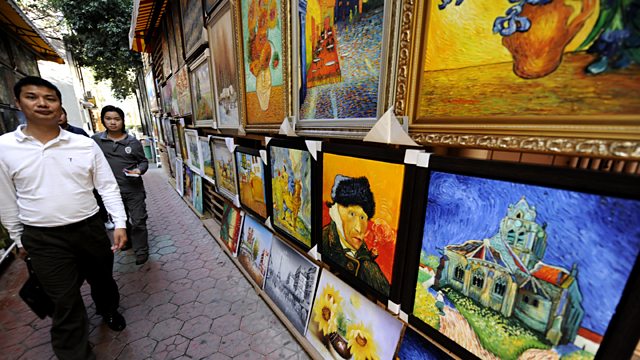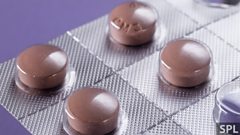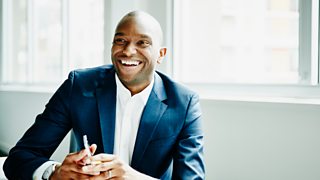Counterfeiting
Fake art and fake medicines – why are there such lucrative markets in both? With Bright Simons, Winnie Wong and Philip Hook
How do you spot a forgery in the art market? How can you tell if a medicine is a useless or even harmful fake which might make your illness even worse? Bridget Kendall is joined by Ghanaian anti-counterfeiting entrepreneur Bright Simons; art auctioneer and author of Breakfast at Sotheby’s – An A-Z of the Art World Philip Hook; and art historian Winnie Wong whose new book Van Gogh on Demand takes us on a trip to China, to a village where every year millions of copies of well-known oil paintings are churned out to be distributed for sale in around the world.
Photo shows copies of Van Gogh's work in the artist village of Dafen near Shenzhen in southern China (Courtesy of Getty Images)
Last on
Clip
-
![]()
How do medical counterfeiters get away with it?
Duration: 01:02
Chapters
-
Modern art expert Philip Hook
The fine art of authentication
Duration: 15:43
Art historian Winnie Wong
When is a copyist painter not a forger?
Duration: 07:17
60 Second Idea
No more weeping on TV please!
Duration: 05:44
Bright Simons
How can fake medicines be combated?
Duration: 11:36
Bright Simons
![Bright Simons]()
Bright is a Ghanaian technology innovator, development activist and social entrepreneur. He is President of the mPedigree Network, a system that empowers consumers in Africa and South Asia to instantly verify with a free text message whether their medicines are safe and not counterfeit. He believes counterfeit drugs find lucrative markets in places where people have low expectations of Western medicine. If the drug does not have the desired effect they are much less likely to report it; as it is not considered to be the medicine that is at fault, but themselves.
Philip Hook
![Philip Hook]()
Philip is senior director of Impressionist and Modern art at Sotheby’s in London. His most recent book, Breakfast at Sotheby’s – An A-Z of the Art World explains how he authenticates a painting and how to spot a fake. He says modern art is the faker’s period of choice, because unlike with Old Masters the aim is no longer simply an accurate rendering of nature; and modern art has a more clear-cut distinction of style, which is more easily imitable.
Winnie Wong
![Winnie Wong]()
Winnie is assistant professor of rhetoric at UC Berkeley. Her book Van Gogh On Demand: China and the Readymade is a study of Dafen village, China, the world's largest production centre for oil-on-canvas painting. She says the painters of Dafen village do not think of the paintings they produce as fakes, or themselves as forgers. In fact, they can be shown to be artists in their own right. Â
60 Second Idea to Improve the World
![60 Second Idea to Improve the World]()
Philip Hook asks for a fine to be paid, in the form of a hefty donation to charity, by TV stations every time they show an unnecessary instance of weeping. Tears are shed too cheaply on our screens. The screening of an episode of weeping would be defined as gratuitous or unnecessary if it contained any of the following: manipulation, exploitation, intrusion, voyeurism, self-indulgence, or self-promotion. And if, for instance, news channels had to pay £5,000 every time they intruded on a bereaved person's grief, or every time a celebrity wept on screen as some sort of fashion statement, then at least a worthy cause would benefit in the form of the appropriate charity of the month.
Broadcasts
- Sun 6 Apr 2014 09:06GMT91Èȱ¬ World Service Online
- Mon 7 Apr 2014 02:06GMT91Èȱ¬ World Service Online
Do you think political or business leaders need to be charismatic? Or do you prefer highly competent but somewhat stern people?
Podcast
-
![]()
The Forum
The programme that explains the present by exploring the past








